- Home
- Lemony Snicket
Who Could That Be at This Hour? (All the Wrong Questions) Page 2
Who Could That Be at This Hour? (All the Wrong Questions) Read online
Page 2
Theodora cleared her throat. “There should be two masks behind you.”
“Masks?” I said.
“Don’t repeat what I say, Snicket. You are an apprentice, not a mynah bird. There are two masks on the backseat. We need them.”
I reached back and found the items in question but had to stare at them for a moment before I found the courage to pick them up. The two masks, one for an adult and one for a child, were fashioned from a shiny silver metal, with a tangle of rubber tubes and filters on the back. On the front were narrow slits for the eyes and a small ripple underneath for the nose. There was nothing where a mouth might be, so the faces of the masks looked at me silently and spookily, as if they thought this whole journey was a bad idea.
“I absolutely agree,” I told them.
Theodora frowned. “That bell means we should don these masks. ‘Don’ is a word which here means ‘put on our heads.’ The pressure at this depth will make it difficult to breathe otherwise.”
“Pressure?”
“Water pressure, Snicket. It’s everywhere around us. Masked or not, you must use your head.”
My head told me it didn’t understand how there could be water pressure everywhere around us. There wasn’t any water. I wondered where all the water had gone when they’d drained this part of the sea, and I should have wondered. But I told myself it was the wrong question and asked something else instead. “Why did they do this? Why did they drain the sea of its water?”
S. Theodora Markson took one mask from my hands and slipped it onto her helmeted head. “To save the town,” she replied in a muffled voice. “Put your mask on, Snicket.”
I did as Theodora said. The mask was dark inside and smelled faintly like a cave or a closet that had not been opened in some time. A few tubes huddled in front of my mouth, like worms in front of a fish. I blinked behind the slits at Theodora, who blinked back.
“Is the mask working?” she asked me.
“How can I tell?”
“If you can breathe, then it’s working.”
I did not say that I had been breathing previously. Something more interesting had attracted my attention. Out the window of the roadster I saw a line of big barrels, round and old, squatting uncovered next to some odd, enormous machines. The machines looked like huge hypodermic needles, as if a doctor were planning on giving several shots to a giant. Here and there were people—men or women, it was impossible to tell in their masks—checking on the needles to make sure they were working properly. They were. With a swinging of hinges and a turning of gears, the needles plunged deep into holes in the shell-covered ground and then rose up again, full of a black liquid. The needles deposited the liquid, with a quiet black splash, into the barrels and then plunged back into the holes, over and over again while I watched through the slits in my mask.
“Oil,” I guessed.
“Ink,” Theodora corrected. “The town is called Stain’d-by-the-Sea. Of course, it is no longer by the sea, as they’ve drained it away. But the town still manufactures ink that was once famous for making the darkest, most permanent stains.”
“And the ink is in those holes?”
“Those holes are long, narrow caves,” Theodora said, “like wells. And in the caves are octopi. That’s where the ink comes from.”
I thought of a friend of mine who had also just graduated, a girl who knew about all sorts of underwater life. “I thought octopi make ink only when they are frightened.”
“I imagine an octopus would find those machines very frightening indeed,” Theodora said, and she turned the roadster onto a narrow path in the shells that twisted upward, climbing a steep and craggy mountain. At its peak, I could see a faint, pulsing light through the afternoon gray. It took me a minute to realize that it was a lighthouse, which stood on a cliff that overlooked what had been waves and water and was now just a vast, eerie landscape. As the roadster sputtered up the hill, I looked out the windows on Theodora’s side and saw that opposite the inkwells was another strange sight.
“The Clusterous Forest,” Theodora said, before I could even ask. “When they drained the sea, everyone thought all of the seaweed would shrivel up and die. But my information says that for some mysterious reason, the seaweed learned to grow on dry land, and now for miles and miles there is an enormous forest of seaweed. Never go in there, Snicket. It is a wild and lawless place, not fit for man or beast.”
She did not have to tell me not to go into the Clusterous Forest. It was frightening enough just to look at it. It was less like a forest and more like an endless mass of shrubbery, with the shiny leaves of the seaweed twisting this way and that, as if the plants were still under churning water. Even with the windows shut, I could smell the forest, a brackish scent of fish and soil, and I could hear the rustling of thousands of strands of seaweed that had somehow survived the draining of the sea.
The bell rang again as the roadster finally reached the top of the hill, signaling the all-clear. We removed our masks, and Theodora steered the car onto an actual paved road that wound past the blinking lighthouse and down a hill lined with trees. We passed a small white cottage and then came to a stop at the driveway of a mansion so large it looked like several mansions had crashed together. Parts of it looked like a castle, with several tall towers stretching high into the cloudy air, and parts of it looked like a tent, with heavy gray cloth stretched over an ornate garden crawling with fountains and statues, and parts of it looked more like a museum, with a severe front door and a long, long stretch of window. The view from the window must have been very pretty once, with the waves crashing below the cliffs. It wasn’t pretty anymore. I looked down and saw the top of the Clusterous Forest, moving in slow ripples like spooky laundry hung out to dry, and the distant sight of the needles spilling ink into the waiting barrels.
Theodora braked and got out of the car, stretched, and took off her gloves and her leather helmet. I finally had a good look at her long, thick hair, which was almost as strange a sight as everything I had seen on the way. I needed a haircut, but S. Theodora Markson made me look bald. Her hair stretched out every which way from her head in long, curly rows, like a waterfall made from tangled yarn. It was very hard to listen to her while it was in front of me.
“Listen to me, Snicket,” my chaperone said. “You are on probation. Your penchant for asking too many questions and for general rudeness makes me reluctant to keep you. ‘Penchant’ is a word which here means habit.”
“I know what penchant means,” I said.
“That is exactly what I’m talking about,” Theodora said sternly, and quickly ran her fingers through her hair in an attempt to tame it. It was impossible to tame, like leeches. “Our first client lives here, and we are meeting with him for the first time. You are to speak as little as possible and let me do the work. I am very excellent at my job, and you will learn a great deal as long as you keep quiet and remember you are merely an apprentice. Do you understand?”
I understood. Shortly before graduation I’d been given a list of people with whom I could apprentice, ranked by their success in their various endeavors. There were fifty-two chaperones on the list. S. Theodora Markson was ranked fifty-second. She was wrong. She was not excellent at her job, and this was why I wanted to be her apprentice. The map was not the territory. I had pictured working as an apprentice in the city, where I would have been able to complete a very important task with someone I could absolutely trust. But the world did not match the picture in my head, and instead I was with a strange, uncombed person, overlooking a sea without water and a forest without trees.
I followed Theodora along the driveway and up a long set of brick stairs to the front door, where she rang the doorbell six times in a row. It felt like the wrong thing to do, standing at the wrong door in the wrong place. We did it anyway. Knowing that something is wrong and doing it anyway happens very often in life, and I doubt I will ever know why.
CHAPTER THREE
After the sixth ring of the doorb
ell, I could hear faint footsteps approaching the door, but my thoughts had drifted someplace else. Instead of standing at the door of a mansion in this strange, faraway place, I imagined myself back in the city, standing at the top of a hole with my tape measure and my trusted associate. I pictured myself in possession of all the belongings I had put in my suitcase. I pretended that I had no need of a strange, shiny mask. And most of all I had a vision of myself in which I was not so very hungry. I had planned to eat something on the train but instead had journeyed a great distance in Theodora’s roadster with not even the tiniest of snacks, and while in my mind I was quite full from an excellent meal, in Stain’d-by-the-Sea my stomach was growling something awful.
It was for this reason that I took little notice of the butler who opened the door for us or the hallway he led us down before opening a set of double doors and asking us to wait in the library. I should have paid attention. An apprentice should pay close attention to the details of a new location, particularly if the furniture seems wrong for the room, or if the library seems to have only a handful of books in it. But I didn’t even look back as the butler shut the doors behind us, and instead cast my eyes across the large, dim room to a small, bright table where tea had been laid out on a tray, along with a dozen cookies on a plate. I walked over to get a closer look. They were almond cookies, although they could have been made of spinach and shoes for all I cared. I ate eleven of them, right in a row. It is rude to take the last cookie.
Theodora had sat down on a small sofa and was looking at me with disgust. “Not proper, Snicket,” she said, shaking her head. “Not proper at all.”
“I saved you one,” I said.
“Sit right here next to me and stop talking,” Theodora said, tapping the sofa with a glove. “The butler told us to wait, and wait we shall.”
Wait we did. We waited long enough that I looked for something to read. The few books on the shelves looked like the sort of books someone would leave behind rather than ever look at again. I read five chapters of a book about a boy named Johnny. He lived in America when America was still England. One day he burned his hand and was no longer able to work as a silversmith, which sounded like a miserable line of work anyway, so he took an interest in local politics. I felt sorry for the guy, but I had other things on my mind and put the book back on the shelf just as the double doors opened and an old woman walked into the room with a limp and a black cane to go with it.
“Thank you for waiting,” she said in a voice even creakier than I’d thought it would be. “I am Mrs. Murphy Sallis.”
“S. Theodora Markson,” said S. Theodora Markson, standing up quickly and yanking me up beside her. “I had been told that my client was a man.”
“I am not a man,” said the woman, with a frown.
“I can see that,” Theodora said.
“It’s very nice to meet you,” I said quickly. Theodora glared at me, but Mrs. Murphy Sallis gave me a brief smile and offered me her hand, which was as smooth and soft as old lettuce.
“Charming boy,” she said, and then frowned again at Theodora. “What does the S stand for?”
“Standing next to me is my apprentice,” Theodora said, and handed the old woman an envelope. Mrs. Sallis tore it open and lowered herself into the largest chair to read it, without offering to ring for more cookies. Even in the dim room, I could see the insignia on the letter, which matched that of my letter of introduction. I’ve never cared for it. The old woman looked about as interested in the letter as I was in Johnny’s silversmithing. “This will do,” she said, and put the letter down on the tray with a quick look at the crumb-covered plate. Then, with a great sigh, as if preparing herself for an important performance, Mrs. Sallis looked at Theodora and began to speak.
“I’m in desperate need of your assistance,” she began. “A priceless item has been stolen from my home, and I need to get it back.”
“First,” Theodora said, “we’ll need to know what the item is.”
“I know that,” the woman snapped. “I was just about to tell you. It’s a small statue, about the size of a bottle of milk. It’s made of an extremely rare species of wood that is very shiny and black in color. The statue has been in my family for generations and has been valued at upward of a great deal of money.”
“A great deal of money,” Theodora repeated thoughtfully. “When was it stolen?”
“That I do not know,” Mrs. Sallis said. “I have not been in this room for quite some time, and normally the statue is kept here in the library, on the mantel over there.”
We looked at the mantel. Sure enough, there was nothing on it.
“Two days ago I came in here looking for something and saw that it was missing. I’ve been upset ever since.”
“Hmm,” Theodora said, and walked quickly to the windows of the library, which were shrouded by heavy curtains. She yanked them aside and then fiddled with both of the windows, first one and then the other. “These are latched.”
“They’re always latched,” Mrs. Sallis replied.
“Hmm.” Theodora crossed slowly to the mantel and then leaned her head down to look at it very closely. There was still nothing on it. She took two large, slow steps backward and then stared up at the ceiling. “What is above this room?”
“A small parlor, I believe,” the old woman said.
“The burglar could have broken into this room from the parlor,” Theodora said. “He or she would have had to saw a hole in the ceiling, of course, but then gravity would have done the rest, dropping the burglar right in front of the mantel.”
Everyone in the room looked at the ceiling, which was as red and blank as the surface of an apple.
“Glue,” Theodora said. “Glue and plaster could cover it up.”
The old woman put her hand to her head. “I know who stole it,” she said.
Theodora coughed a little. “Well, that doesn’t necessarily mean they didn’t come in through the ceiling.”
“Who stole it?” I asked.
The old woman rose and limped to one of the windows. She pointed out at the lighthouse we had passed on the way. “The Mallahan family,” she said. “They’ve been enemies of my family for many lifetimes. They always swore they’d steal the statue, and at last they have.”
“Why didn’t you call the police?” I asked.
Mrs. Murphy Sallis looked surprised and stammered for a few seconds before Theodora butted in. “Because she called us,” she said. “Rest assured, Mrs. Sallis, we will find this statue and bring the thieves to justice.”
“I just want the statue back with its rightful owner,” the old woman said hastily. “I want nobody to know you are working for me, and I want nothing done to the Mallahans. They’re nice people.”
It is not common to hear someone refer to enemies of their family for many lifetimes as “nice people,” but Theodora nodded and said, “I understand.”
“Do you?” the woman demanded. “Do you promise to return the statue to its rightful owner, and do you promise to be discreet about the Sallis name?”
My chaperone waved her hand quickly, as if an insect were flying in her face. “Yes, yes, of course.”
Mrs. Sallis turned her gaze to me. “And what about you, lad? Do you promise?”
I looked right back at her. To me, a promise is not an insect in my face. It is a promise. “Yes,” I said. “I promise to return the statue to its rightful owner, and I promise to be discreet about who has hired us.”
“Mrs. Sallis has hired me,” Theodora said sternly. “You’re just my apprentice. Well, Mrs. Sallis, I believe we’re all done here.”
“Perhaps Mrs. Sallis could tell us what the statue looks like,” I said.
“I’m sorry,” Theodora said to Mrs. Sallis. “My apprentice apparently wasn’t listening. But I remember. It’s the size of a milk bottle, made of shiny, black wood.”
“But what is it a statue of?”
Mrs. Murphy Sallis limped one step closer and gave us each a long, dark l
ook. “The Bombinating Beast,” she said. “It is a mythical creature, something like a sea horse. Its head looks like this.”
She lifted one limp hand from her cane to reveal the head of a creature carved into its top. The creature looked like a sea horse like a hawk looks like a chicken. Its eyes were thin and fierce, and its lips were drawn back in a snarl to reveal rows and rows of tiny, sharp teeth. Even at the end of a cane, it looked like something you’d want to avoid, but plenty of people put nasty things on their mantels.
“Thank you,” Theodora said briskly. “You’ll be hearing from us, Mrs. Sallis. We’ll let ourselves out.”
“Thank you,” the old woman said, and took another deep sigh as we walked back down the hallway and out of the mansion. The butler was standing on the lawn, facing away from us with a bowl of seeds he was throwing to some noisy birds. They whistled to him, and he whistled back, mimicking their calls exactly. It would have been pleasant to watch that for a few more minutes, and I wish I had. But instead Theodora started the roadster’s engine, put her helmet back on her head, and was halfway down the driveway before I had time to shut the door.
“This will be an easy case!” she crowed happily. “It’s not often that a client gives us the name of the criminal. You’re bringing me luck, Snicket.”
“If Mrs. Sallis knew who the burglar was,” I asked, “why wouldn’t she call the police?”
“That’s not important,” Theodora said. “What we need to figure out is how the Mallahans broke in through the ceiling.”
“We don’t know that they broke in through the ceiling,” I said.

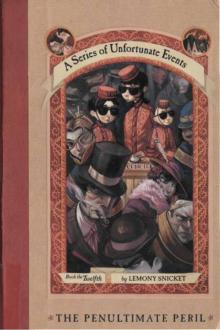 The Penultimate Peril
The Penultimate Peril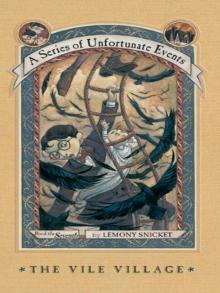 The Vile Village
The Vile Village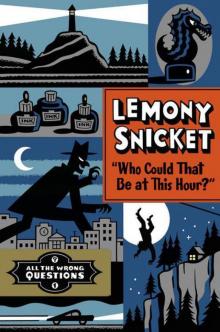 Who Could That Be at This Hour?
Who Could That Be at This Hour?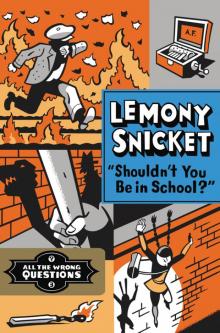 Shouldn't You Be in School?
Shouldn't You Be in School?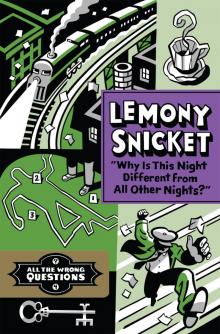 Why Is This Night Different From All Other Nights?
Why Is This Night Different From All Other Nights?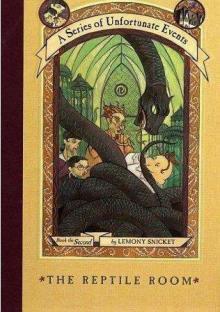 The Reptile Room
The Reptile Room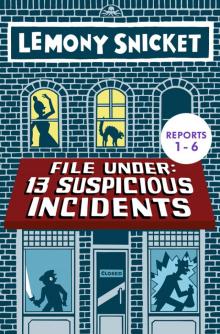 File Under: 13 Suspicious Incidents (1-6)
File Under: 13 Suspicious Incidents (1-6) The End
The End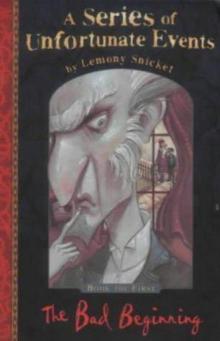 The Bad Beginning
The Bad Beginning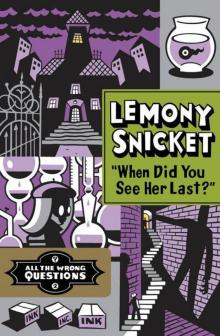 When Did You See Her Last?
When Did You See Her Last?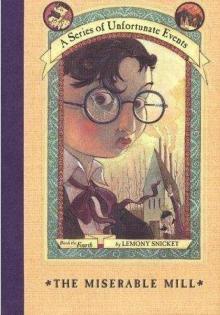 The Miserable Mill
The Miserable Mill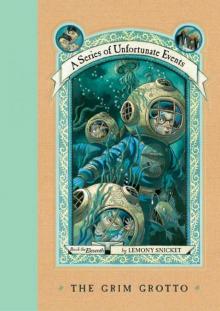 The Grim Grotto
The Grim Grotto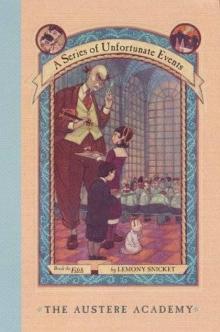 The Austere Academy
The Austere Academy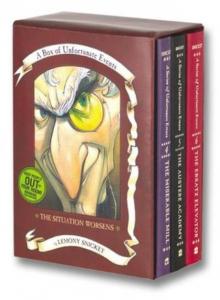 The Ersatz Elevator
The Ersatz Elevator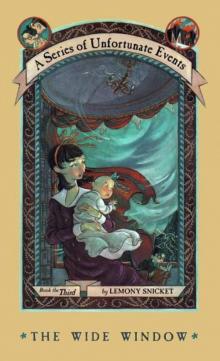 The Wide Window
The Wide Window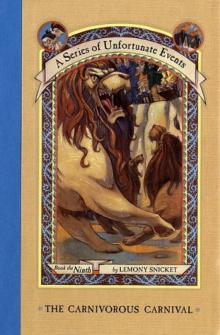 The Carnivorous Carnival
The Carnivorous Carnival A Series of Unfortunate Events Box: The Complete Wreck
A Series of Unfortunate Events Box: The Complete Wreck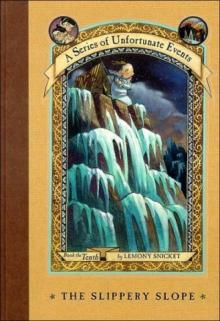 The Slippery Slope
The Slippery Slope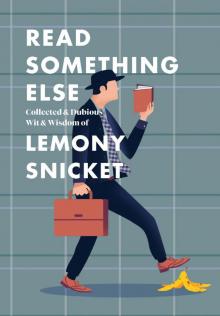 Read Something Else
Read Something Else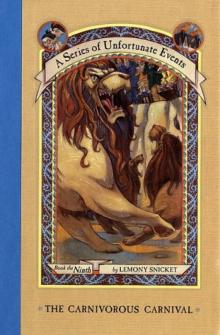 The Carnivorous Carnival asoue-9
The Carnivorous Carnival asoue-9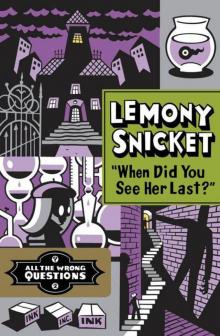 When Did You See Her Last
When Did You See Her Last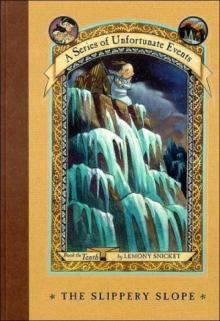 The Slippery Slope asoue-10
The Slippery Slope asoue-10 The Hostile Hospital asoue-8
The Hostile Hospital asoue-8 A Series of Unfortunate Events Collection: Books 1-13 with Bonus Material
A Series of Unfortunate Events Collection: Books 1-13 with Bonus Material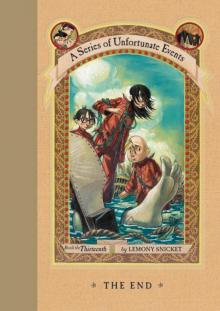 The End asoue-13
The End asoue-13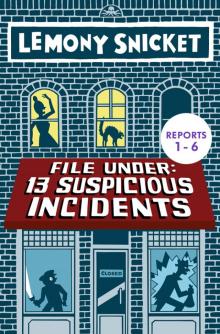 File Under
File Under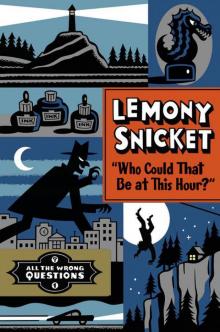 Who Could That Be at This Hour? (All the Wrong Questions)
Who Could That Be at This Hour? (All the Wrong Questions)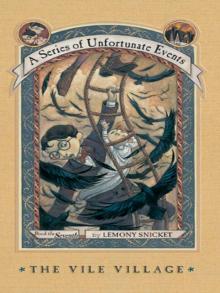 The Vile Village asoue-7
The Vile Village asoue-7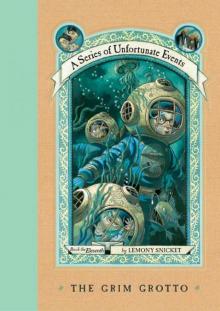 The Grim Grotto asoue-11
The Grim Grotto asoue-11